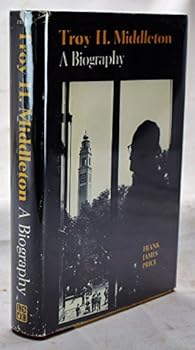Troy H. Middleton: A Biography
Dust jacket notes: "Troy H. Middleton attained a remarkable record as the youngest colonel in the American Expeditionary Force in France during World War I, and as commander of the Army's Forty-fifth... This description may be from another edition of this product.
Format:Hardcover
Language:English
ISBN:0807100676
ISBN13:9780807100677
Release Date:January 1974
Publisher:LSU Press
Length:416 Pages
Weight:1.85 lbs.
Customer Reviews
4 ratings
Biography of Troy Middleton
Published by Thriftbooks.com User , 14 years ago
This is a distant relative and I found the book very interesting. Well written. I did not know Troy Middleton but now wish I could have the pleasure.
General and Educator
Published by Thriftbooks.com User , 17 years ago
This biography provides an well-written account of General Troy Middleton's life from his service in World War I, corps command in Europe during World War II, and his long service at Louisiana State University. Middleton read the entire book and approved its contents, so it's an authorized biography and there is nothing really critical of him in it. But the author had the advantage of years of intimate association with Middleton and access to his papers. The most interesting theme of the book is how a quiet and decent man could successfully command hundreds of thousands of men, send them into battle, and defeat the Nazis. Another strength of the book is the detailed description of the Battle of the Bulge (Middleton commanded the corps took the initial impact of the German attack). Also interesting is Middleton's long association with LSU from being ROTC cadet commandant to a long term as president. Price also relates many interesting anecdotes from Middleton's years of service in important battles. Finally, the book gives a good sense of army service between the wars. The most important weakness of the book is the lack of discussion about Middleton's military strategies. Marshall granted his request to return to active duty in early 1942, although he had retired in 1937, and in so doing made an exception to his rule that his senior commanders should be under 50 (Middleton was 52 when he came back from retirement). Why did Middleton have the reputation of such a great commander? He was a cautious man (unlike Patton, whom Marshall also felt essential), and yet he was also a great commander. I feel Price missed a great opportunity to explore this critical topic (although most military biographies seem to have the same weakness). Another missing topic is Middleton's change of heart regarding segregation in education. He wrote a letter to the LSU board, quoted in the book, strongly advocating segregation in the mid-1950s. Yet by the mid-1960s, Middleton had become an effective chairman of the Louisiana state commission that helped resolve many racial disputes. How did this evolution occur? Overall, an informative, insightful, and interesting book.
Patton's best corps commander
Published by Thriftbooks.com User , 18 years ago
General Patton recommended that if he was a casualty that Generall Middleton succed him. Patton regarded Middleton as a very cautious general, certainly more cautious than Walton Walker(XX corps commander and later commander of 8th Army in Korea) but more intellectually qualified to command an army. Middleton was should be more famous for his command of the VIII corps in the Battle of the Bulge, which bore the brunt of the initial German onslaught.
Rare Biography of a WWII Corps Commander!
Published by Thriftbooks.com User , 22 years ago
With the exception of Gen J. Lawton Collins, little attention is placed at the level of corps command during WWII. With new biographies of Dwight D. Eisenhower and George S.Patton surfacing regularly, one wonders if and when the focus will trickle down to the two-star generals who actually fought the battles that made up the various campaigns of the war. It is for this reason that Frank James Price's biography (first published in 1974) of Troy H. Middleton is significant.Middleton, the youngest colonel to command a regiment in WWI, commanded the 45th Infantry Division on Sicily. In March, 1944, Ike gave Middleton command of VIII Corps. It was Middleton's 4th Armored Division (Maj. Gen. John S. Wood) that spearheaded the breakout from Normandy. It was Middleton's VIII Corps that was left behind to fight in Brittany, while the rest of the American Army raced for the German border. And it was Middlton who held the southern flank during the Battle of the Bulge.Price's book is really two works combined. The first half covers Middleton's military career; the second part his career on the admisitrative faculty at Louisiana State University. Written while Middleton was still alive, Price conducted hundreds of hours of interviews with his subject. Thus, Price's work takes on the qualities of a memoir rather than an objective biography. I was also looking for a bridge between Middleton's military and civilian careers. How does a professionally trained Army officer make corporate decisions? Price (also at the time on the faulty at LSU) does not provide that bridge. Asside from these minor flaws, I reccomend Price's biography. Middleton's achievments in WWII alone should have warranted him more exposure. Although not as political as Eisenhower and, certainly not as flamboyant as Patton, Middleton story sheds light on a level of command so often overlooked by military historians.






